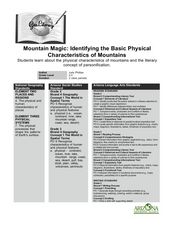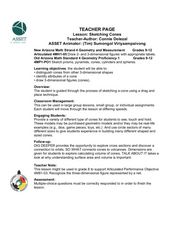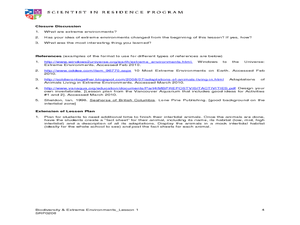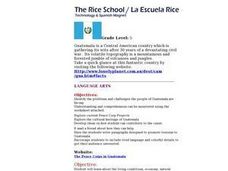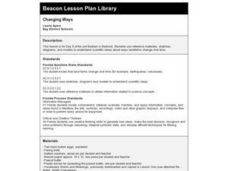Curated OER
Leapin' Landmarks: Locating 10 Man-made Landmarks Around the World
Third graders label continents, oceans, and major mountain ranges on maps and use the maps to write an informational report about landmarks. In this landmarks lesson plan, 3rd graders write about 1 major landmark.
Curated OER
Mountain Magic: Identifying the Basic Physical Characteristics of Mountains
Students read about and identify on maps the physical characteristics of mountains. For this mountains lesson plan, students also write about the characteristics using personification.
Curated OER
What's Holding Up the Water?
Students read about the history and locate dams in Arizona. In this Arizona dams lesson plan, students write a summary about what they read focusing on word choice, ideas, conventions, and geography content.
Curated OER
Normal (dip-slip) Earthquake!
Students label the fault lines and tectonic plate boundaries on the world map. In this earth science lesson, students simulate ocean floor formation using CEENboTs. They explain the causes of earthquakes.
Curated OER
Sketching Cones
Students sketch cones and identify its properties. In this geometry lesson, students calculate the surface area and volume of each three dimensional shape. they define and sketch prisms, pyramids and cylinders.
Curated OER
Mapping the National Parks
Students research national parks. In this science lesson, students view a video about the national parks and discuss the environments found within the national parks.
Curated OER
Frogs Frogs Frogs
Students view a disk on the continental movement and analyze the given data on fossils, rock types and climate zones. In this geology lesson students draw a diagram of the earths layers, take a quiz complete a PowerPoint presentation.
Curated OER
Give me Food!
Students study the food guide pyramid and use it to create their own eating program.In this health lesson students visit websites to calculate their BMR, activity level and weight then create a nutrition plan
Curated OER
The Fault Line
Students use cardboard models of the North American and Pacific plates and sand to investigate what happens when there is an earthquake or movement along the boundaries of the plates.
Curated OER
Mapping Deep-Sea Habitat
Students create a two-dimensional topographic map and a 3-D model of landforms. In this creative lesson students create 2 and 3-D objects and learn how to interpret the data from these things.
Curated OER
The Oceanographic Yo-Yo
Students examine how oceanographers use chemical and physical parameters of seawater to locate hydrothermal vents. In this ocean lesson plan students complete an activity and worksheets.
Curated OER
Extreme Environments
Students examine extreme environments and the characteristics that make them. In this adaptation instructional activity students see how animals have adapted to these environments.
Curated OER
The Scientist in Me
Young scholars make a poster. In this scientist lesson, students define the term scientist, draw pictures of themselves as scientists, and write about what they would study as a scientist.
Curated OER
Coqui Frog Populations
Students research Coqui frogs. Students explore the life cycle of coqui frogs and discover how these frogs have become an invasive species in Hawaii.
Curated OER
Shake, Rattle and Erupt
Students study myths regarding four earthquakes myths. They receive a list of supplies each family should have at home to prepare for an earthquake and construct an "Earthquake Preparation" poster showing some of the most important items...
Curated OER
Soil Layers
Ninth graders identify the different layers of soil. In this earth science lesson, 9th graders explain how limestone layers are formed. They identify the different parts of the coral colony.
Curated OER
The Planets Terra Firma
Students explore the theories of the creation of the universe and examine the properties of celestial bodies. They analyze the relationship between the sun, Earth and the other planets.
Curated OER
How to Recycle a Rock
Third graders explore the rock cycle and explore how rocks are made, changed, destroyed and recreated. They create representations of these processes with hands-on activities.
Curated OER
Guatemala
Fifth graders explore what types of projects the Peace Corp is doing to help Guatemala.
Curated OER
Changing Ways
Third graders examine hard boiled eggs as possible models for the earth's layers.
Curated OER
Bermuda Today: Who Were Its Geologic Ancestors?
Students explore how the island of Bermuda came to be.
Curated OER
Geology of Waipi'o Valley
Students predict how the Big Island and Waipi'o Valley formed and write an essay that includes their predictions. They research online to find the real way it formed and experiment with sand to show how a stream develops.
Curated OER
Where Did It Come From?
Students research island formation, plot locations on a map and make an analysis of why some islands are formed where they are.
Curated OER
Preformatted Text
Pupils examine how to create a table of aligned text. They apply tabs and spaces to control the placement of text on a page.
Other popular searches
- Types of Volcanoes
- Volcanoes and Earthquakes
- Shield Volcanoes
- Erupting Volcanoes
- Science Project Volcano
- Composite Volcanoes
- Internet Research Volcanoes
- Volcano Word Search
- Volcano Math Lesson
- Volcanoes Earthquakes
- Caribbean Volcanoes
- Dome Volcano

